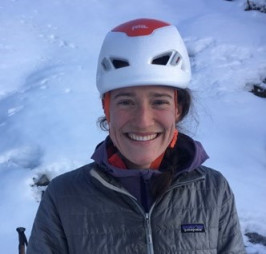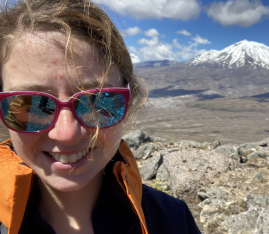ECR Forum Committee Members
About
Committee members of the ECR Forum generally commit to serving a three-year term. Committee members will be selected with concern for the ECR Forum’s representativeness regarding gender, ethnicity, geographic location, occupational sector, and disciplinary affiliation. Co-chairs will generally serve a two year term, followed by a single year as a committee member.
Kristie Cameron - Chair (Unitec)

Kristie is an Associate Professor in the School of Environmental and Animal Sciences at Unitec in Animal Behaviour Science and an emerging researcher in the field of experimental and applied animal behaviour. Kristie’ research focus is using behavioural economics and applied behaviour analysis to study captive, companion and laboratory animal behaviour and husbandry to improve and inform animal welfare science and educate owners and animal handlers.
Hadee Thompson-Morrison (Bioeconomy Science Institute)

Hadee is a researcher in soil chemistry working at the Bioeconomy Science Institute. Her research focuses on sustainable land use and, soil quality, and trace element behaviour in the environment. Hadee also works in the non-profit sector: she is a board member and project manager for Darwin Animal Doctors, a US-based charity focusing on humane education and conservation across the globe, and in 2019 she co-founded Sumatra Community & Conservation Trust, a NZ-based charitable trust that supports forest-edge communities in Sumatra, Indonesia. As well as being a passionate advocate for early-career researchers, Hadee also advocates for women in science, and was awarded the 2024 Zonta Science Award in recognition of this.
For 2026, Hadee is the ECR Board Observer participant on the Society Council's newly launched programme. At the conclusion of the programme, Hadee will return to a Co-chair role for the ECR Forum Committee.
Joya Kemper - Committee Member (University of Canterbury)

Joya is a Senior Lecturer at the University of Canterbury. She is passionate about transforming our economic and market system towards sustainable, ethical, and healthy consumption and production with a focus on behaviour, organisational and institutional change. Joya's research centres on four key themes: Business transformation (circular economy, waste reduction, sociopolitical activism), Sustainable and Healthy Eating (such as meat reduction, future foods/alternative proteins), Social Change (behaviour change, social and institutional change) and Education for Sustainable Development. She is an advocate for transdisciplinary research, believing that wicked problems will only be solved with multi-sector collaboration.
Olivia Truax - Committee Member (University of Canterbury)

Dr. Olivia Truax is a lecturer in the School of Earth and Environment at the University of Canterbury. Olivia’s research focuses on the history of the Antarctic and Greenland ice sheets and their response to a warming climate. Her current projects examine the past, present, and future of ice sheet meltwater and its impacts on climate in Aotearoa New Zealand.
Ery Hughes - Committee Member (Te Pū Ao GNS Science)

Ery is a Volcanic Fluid Geochemist at Te Pū Ao GNS Science and part of the Technical Team for Volcanica, the Diamond open-access journal for all things volcano-related. She uses experiments, modelling, and natural samples to understand the influence of gas on volcanic eruption dynamics, how to interpret gas emission data for volcano monitoring, and model planetary-scale volatile cycling. She is also a GeoNet Volcano Duty officer and helps to collect, analyse, and interpret gas and fluid samples collected from volcanoes and geothermal systems for monitoring Aotearoa’s volcanoes.
Lauren Vinnell - Committee Member (Massey University)

Lauren is a Senior Lecturer in Emergency Management at the Joint Centre for Disaster Research, Massey University, Wellington. Her background is in applied social psychology and behaviour change. She primarily uses quantitative and experimental survey methods to study topics including risk perception and communication, predictors of natural hazard preparation, and improving human behaviour during earthquake shaking through drills and warnings.
Samantha Heath - Committee Member (University of Waikato)

Samantha is a Senior Lecturer in Nursing at the University of Waikato. Samantha's research interests are focussed on education for healthcare professionals. A former Florence Nightingale Scholar, Samantha came to New Zealand in the late 1990's as part of her study tour investigating how teaching and learning about cultural safety impacted care delivery. Most recently, she was a Whitinga Fellowship recipient and continues to investigate how the nursing curriculum might need to be adapted to accommodate New Zealand's changing demographics.
Akbar Hossain - Committee member (Eastern Institute of Technology )

Dr. Md Akbar Hossain serves as a Senior Lecturer in the School of Computing at the Eastern Institute of Technology (EIT) and is also an Adjunct Researcher in the School of Engineering, Computer & Mathematical Sciences at Auckland University of Technology (AUT). He leads innovative projects focused on neuromorphic road-accident prediction and darknet analytics for ransomware profiling, designs and teaches postgraduate curricula in Data Analytics and Cybersecurity, and supervises Master’s theses. Dr. Hossain obtained his PhD from AUT, where he was honoured with the Dean’s Outstanding Doctoral Award, and he holds an M.Sc. in Telecommunications Engineering from the University of Trento, Italy. Following the completion of his master’s degree, he received a Marie Curie Early-Stage Research Fellowship, which enabled him to contribute to EU-funded projects in Germany and Greece. His research interests encompass wireless and sensor networks, cognitive radio, artificial intelligence, and cybersecurity. An active participant in the academic community, he acts as an Associate Editor for the International Journal of Computers and Applications (Taylor & Francis) and serves as a reviewer for JNCA, Ad-Hoc Networks, and IEEE Transactions on Communications. Before entering academia, Akbar worked as a Senior Consultant at Deloitte New Zealand, providing guidance on R&D claims. He has also held lecturing and program leadership positions at the Manukau Institute of Technology, AWI International Education Group, and Chittagong University of Engineering & Technology. A Senior Member of IEEE and a Fellow of the Higher Education Academy, he has published over sixty peer-reviewed papers and possesses multiple professional certifications.
Ying Wang - Committee Member (University of Auckland)

Ying (Ingrid) Wang is a research fellow at the Centre for Arts and Social Transformation at the University of Auckland. Her work focusses on arts-based research to advance wellbeing, health, education, and social transformation, particularly emphasising supporting culturally diverse communities. Ying has a clinical background as a creative arts therapist, specialising in supporting immigrant clients and survivors of sexual abuse. Her scholarship integrates innovative methodologies and culturally nuanced approaches to both research and practice.
Alehandrea Raiha Manuel - Committee Member (University of Auckland)

Alehandrea Raiha Manuel is a Ngāti Porou-Ilocana audiology and public health lecturer and research fellow at Waipapa Taumata Rau, the University of Auckland. She has experience in Indigenous ear and hearing health research across Aotearoa New Zealand, Australia, and Turtle Island. Alehandrea is a Fulbright Science and Innovation Graduate and was recently awarded a Health Research Council (HRC) Eru Pōmare Postdoctoral Fellowship for her research on hearing and vision health with Rangatahi Māori and Growing Up in New Zealand. Alehandrea’s work is embedded within Indigenous methodologies and has expanded to include implementation and pragmatic science, co-creation, kaupapa Māori epidemiology, integrated care and transdisciplinary health research.
Juliana Yeung - Committee Member (Bioeconomy Science Institute and LucidomeBio)

Juliana Yeung is a scientist at the Bioeconomy Science Institute (AgResearch group) and LucidomeBio, based in Palmerston North. Her research centres on immunoproteomics and vaccine development, identifying microbial surface antigens to reduce methane emissions in livestock and address sheep pneumonia. Since relocating to Aotearoa New Zealand in 2018, she has led multidisciplinary projects in animal health. Juliana is passionate about science communication, sustainability, and community engagement. She delivers public talks, chairs networking events for early career researchers, and serves on scientific and local committees, promoting inclusive and collaborative science across disciplines.
